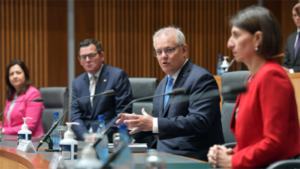Home » Commentary » Opinion » A royal commission into coronavirus? Be careful what you wish for
· Spectator

Some former politicians and commentators are suggesting there be an ‘independent’ review in the form of a royal commission to assess Australia’s handling of the pandemic.
There is certainly plenty that needs looking into: the Commonwealth’s rollout of the vaccine; use of evidence and expert advice by chief health officers and medical authorities; misreporting by the media; the efficacy of border closures, lockdowns, and curfews; suspension of parliamentary sittings; loss of civil liberties; police brutality; the economic, education and social impacts; and the effectiveness of that specially created new body — the National Cabinet.
However, before we launch yet another royal commission — there have been nine Commonwealth ones appointed since 2013 costing nearly a billion dollars — we need to ask whether a royal commission would work or indeed if any review would be politically feasible.
Also, let’s not forget the first two royal commissions appointed by the federal Coalition into the home insulation program and trade union governance were abject failures. As John Howard said, they appeared to be appointed for “narrow targeted political purposes” on issues “on which the public has already delivered a verdict”. They achieved little and one has come more unstuck since, after serious allegations against its former chair.
As a royal commission can only be appointed by executive government, the first issue is which government in Australia would appoint one — given its coercive investigatory powers and high public profile — that might result in exposing a government’s mismanagement of the pandemic?
Clearly, to review the nation’s response, any royal commission would have to be appointed by the Commonwealth.
The trouble is a Commonwealth royal commission has no powers to call witnesses or procure information from the states. So, a thorough review can only occur if the states and territories sign up for a joint federal-state inquiry.
While there have been many joint federal-state royal commissions it is hard see any state supporting one unless its terms of reference were heavily slanted to investigate the Commonwealth; like over the roll-out of the vaccine. Imagine trying get an agreement with six states and two territories on the royal commission’s terms of reference.
A related issue is who would be its chair? An ex-judge, while independent, may not be seen as expert enough. Business criticised the Royal Commission into Banking for that very reason. A panel of experts would be the alternative but who would they be and from what fields? With a federal-state royal commission, every state and territory would want someone from their patch to be involved and so would the different professions — seeding more wrangling and a membership so large that agreement on anything would be almost impossible.
Then there is the issue of when should a royal commission be established – now while events are still unfolding or some time in the future when the pandemic is ‘over’ – but when will it be over and who will say so? We might have to wait years for the ‘all clear’ signal.
Last, how long would such a royal commission take, what would be its recommendations and to whom would it report?
The average length of royal commissions is about 20 months – some take four years. That is a long time in politics. Interest would wane and actions dissipated. And what would be recommended: the states giving up powers to the Commonwealth or another exhortation for improved federal-state coordination? How would these issues be resolved: refer them to the National Cabinet that is a possible review target itself?
There is no doubt an ex-post review of our nation’s response to the pandemic — warts and all — is sorely needed.
However, a royal commission is the wrong instrument for the task. It is too grand, too threatening, and potentially, too slow, and costly. Even a more fit for purpose review would struggle to produce a report with acceptable recommendations given the intense politics and self-interest that have characterised Australia’s response to the pandemic.
This is the state our nation is now in.
A royal commission into coronavirus? Be careful what you wish for